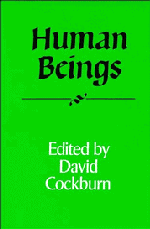Book contents
- Frontmatter
- Contents
- Introduction
- Machines as Persons?
- The Importance of Being Human
- Response to McNaughton
- Response to Diamond
- Real Selves: Persons as a Substantial Kind
- Personal Identity and Brain Transplants
- Personal Identity and the Idea of a Human Being
- Imagination and the Sense of Identity
- Radical Critique, Scepticism and Commonsense
- Getting the Subject back into the World: Heidegger's Version
- Incarnational Anthropology
- How Many Selves Make Me?
- Sartre and Our Identity as Individuals
- Bibliography
- Notes on Contributors
- Index
Response to Diamond
Published online by Cambridge University Press: 05 February 2015
- Frontmatter
- Contents
- Introduction
- Machines as Persons?
- The Importance of Being Human
- Response to McNaughton
- Response to Diamond
- Real Selves: Persons as a Substantial Kind
- Personal Identity and Brain Transplants
- Personal Identity and the Idea of a Human Being
- Imagination and the Sense of Identity
- Radical Critique, Scepticism and Commonsense
- Getting the Subject back into the World: Heidegger's Version
- Incarnational Anthropology
- How Many Selves Make Me?
- Sartre and Our Identity as Individuals
- Bibliography
- Notes on Contributors
- Index
Summary
Where two people differ about the application of some term to a particular object, to what can they appeal to settle their disagreement? In my paper I suggested that the disputants can legitimately draw attention to various features of the contested case to try to show the continuity, or lack of it, between this case and other instances that fall under the concept. In so doing they are offering reasons to justify their judgement in this particular case.
I am now inclined to think that such an approach is only likely to be successful if the disagreement between the parties is not too radical. This is so where they share a common understanding of the term in question but disagree about a hard case. Here, the features to which they appeal, and the significance those features have, will be determined by that shared understanding. But their disagreement may go deeper. They may have competing conceptions of the same term which give each of them a quite different approach to the case in question. In particular, what is a hard case on one approach may be a paradigm case of the concept on the other. Lacking a shared conception, it is likely that neither disputant will be able to appreciate the significance of the features of the case in hand to which the other draws attention. Each will be an outsider to the other's practice.
- Type
- Chapter
- Information
- Human Beings , pp. 85 - 86Publisher: Cambridge University PressPrint publication year: 1991



